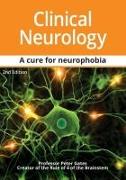- Start
- Clinical Neurology A Cure for Neurophobia
Clinical Neurology A Cure for Neurophobia
Angebote / Angebote:
This is the second edition of an introductory clinical neurology textbook written for students, hospital medical officers, neurologists in training, non-neurologist's and those that teach them. It contains the principles of clinical neurology that were relevant 100 years ago and will still be relevant in 100 years. It contains novel approaches to clinical neurology. The nervous system is likened to a map grid with meridians of longitude (the two ascending sensory and the one descending motor pathways) and the parallels of latitude, (the dermatomes, myotomes, reflexes, brainstem cranial nerves and the cortical signs). This enables accurate localisation.
It contains 3 rules that enable the diagnosis of brainstem strokes (the rule of 4) and every peripheral nerve or nerve root problem in the upper (the 5*3*5* rule) and the lower limbs (the 2*2*4 rule) without the need for detailed knowledge of neuroanatomy.
There are numerous illustrations and tables that complement the text.
The first 5 chapters cover neuroanatomy, the neurological history, examination of the limbs, the brainstem and cranial nerves, and the cerebral hemispheres. There is a unique chapter (6) that explains the diagnostic approach once the history and neurological examination have been performed. Subsequent chapters cover intermittent disturbances of neurological function (with a very unique approach dividing disturbances into those that call falls and those that do not cause falls either with and without impairment of consciousness), seizures and epilepsy, headache and facial pain, cerebral vascular, disease, common neck and arm problems, back pain and common leg problems, abnormal movements and difficulty walking and miscellaneous neurological disorders. The last chapter discusses retrieving information and keeping up to date.
The appendices discuss the bedside assessment of cognitive function , benign focal seizures of childhood, new nomenclature and drugs for epilepsy, treatment of migraine, epidemiology and prevention of stroke, tissue plasminogen activator and clot retrieval, dysphagia screen, nerve conduction studies and EMG, diagnostic criteria for multiple sclerosis and treatment of Parkinson's.
Finally, Professor Gates reprints his 3 hypothesis papers. Firstly, that hypertension is secondary to, not the cause of arteriorsclerosis with superimposed atherosclerosis. Secondly, that Meniere's disease is a sodium dependant potassium channelopathy and has nothing to do with endolymphatic hydrops. Thirdly, his insights into the management of Idiopathic Intracranial Hypertension (IIH), in particular the potential use of short-term drainage of CSF at very low pressure and resolution of IIH.
Folgt in ca. 10 Arbeitstagen
